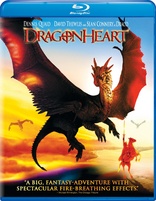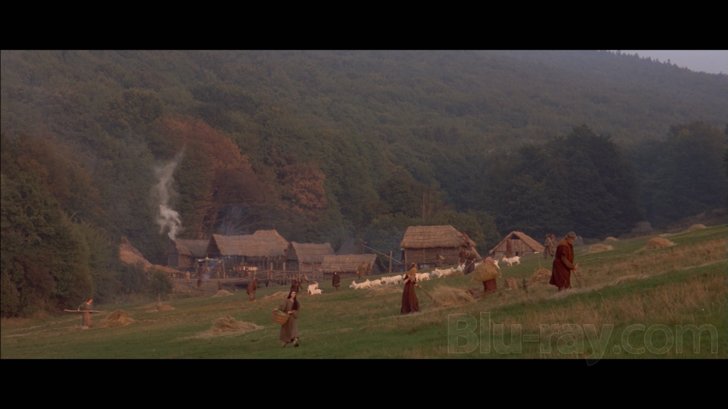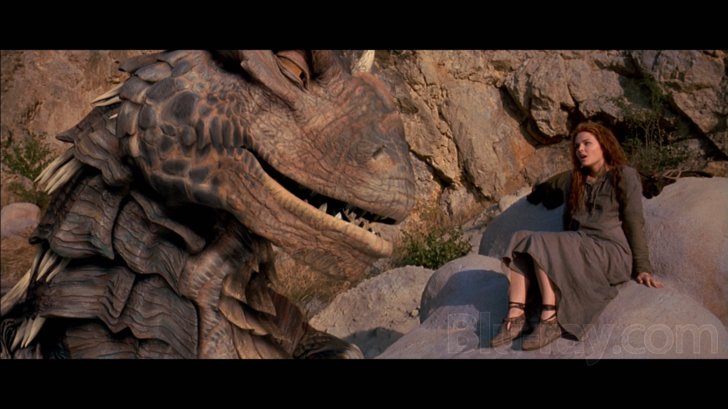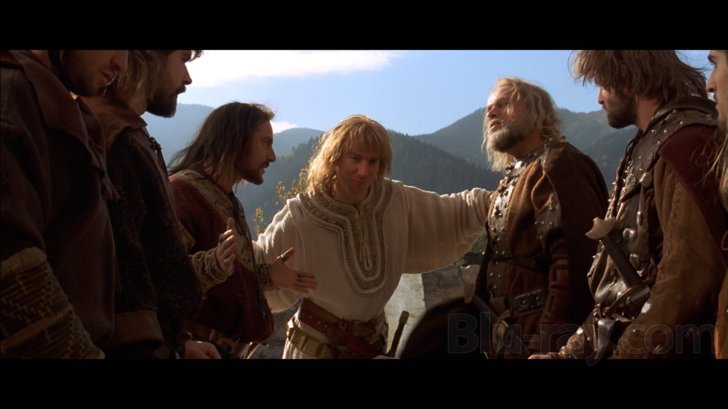DragonHeart Blu-ray Movie
HomeDragonHeart Blu-ray Movie 
Universal Studios | 1996 | 103 min | Rated PG-13 | Mar 27, 2012
Movie rating
6.6 | / 10 |
Blu-ray rating
| Users | 3.8 | |
| Reviewer | 3.5 | |
| Overall | 3.6 |
Overview
DragonHeart (1996)
After being wounded in battle, the young King Einon is healed by Draco, a dragon, who gives Einon part of his heart. Some years later, Bowen, a knight, forms a partnership with Draco in which Draco terrorizes a village, then Bowen pretends to slay him and collects a reward from the grateful villagers. But now Bowen and Draco must save the entire kingdom from Einon, who has succeeded to the throne and become an evil tyrant -- and whose life is still protected by the heart that Draco gave him all those years ago.
Starring: Dennis Quaid, Sean Connery, Dina Meyer, David Thewlis, Pete PostlethwaiteDirector: Rob Cohen (I)
| Fantasy | Uncertain |
| Adventure | Uncertain |
| Action | Uncertain |
Specifications
Video
Video codec: VC-1
Video resolution: 1080p
Aspect ratio: 2.35:1
Original aspect ratio: 2.39:1
Audio
English: DTS-HD Master Audio 5.1
Subtitles
English SDH, French, Spanish
Discs
50GB Blu-ray Disc
Single disc (1 BD)
BD-Live
D-Box
Mobile features
Playback
Region free
Review
Rating summary
| Movie | 2.5 | |
| Video | 3.0 | |
| Audio | 4.5 | |
| Extras | 3.5 | |
| Overall | 3.5 |
DragonHeart Blu-ray Movie Review
Heartburn
Reviewed by Michael Reuben April 17, 2012Even when it was released, DragonHeart was more notable as a feat of technology than an achievement in cinemaŚand technology has moved on. Producer Raffaella De Laurentiis had tried to set up the project at Universal for years and had even gone so far as to hire Jim Henson's Creature Shop to build the key character, Draco the dragon, as a puppet, so that test footage could be shot. But then director Rob Cohen, with whom De Laurentiis had just made Dragon: The Bruce Lee Story (the title was either a coincidence or a portent) saw Jurassic Park with its CG dinosaurs and persuaded his producer friend that computer animation was the way to go. Draco thereby became the next stage in Industrial Light and Magic's development of CG in film: the first fully realized character who existed solely in the digital domain. If only Draco inhabited a better film. Although Cohen insists in the supplements that the film was successful, in fact its critical reception was mixed and its box office performance a disappointment. The film's chief return on the studio's $57 million investment (which was a lot then) has been from home video, where it has become a perennial because, among other reasons, DragonHeart's inventive soundtrack is the very definition of "demo material" for a good 5.1 setup. (See the "Audio" section for further discussion.) But as an absorbing fairy tale of knights, dragons and valor, the film falls flat. The problem begins with the script by Patrick Read Johnson, who first conceived the story, and Charles Edward Pogue, who turned it into a screenplay. Cobbling together bits and pieces from Arthurian legend, Celtic mythology and stuff they just made up, Johnson and Pogue created a fantasy that feels utterly synthetic, a product of pitch meetings by people with no real grasp of the medieval ethos they're trying to glorify. And Cohen shares the same disconnect as director, which explains the film's frequent and abrupt shifts in tone, from farce to chivalry to tragedyŚnone of which work, because they seem random and arbitrary. Over a decade earlier, British writer Richard Carpenter, who knew the Celtic legends inside and out, combined humor, adventure and tragedy with great success on a fraction of the budget and nary a computer in sight in the TV series Robin of Sherwood. All the technology in the world can't make up the difference if one lacks a vital connection to the source material.

In England of 984 A.D., Bowen (Dennis Quaid), a knight, trains the young Prince Einon (Lee Oakes) in the art of sword combat and the values of traditional chivalry. A thug in the king's service, Brok (Brian Thompson), arrives with the news that King Freyne (Peter Hric) wants his son to observe as the King and his troops suppress a peasant rebellion. Bowen disapproves, because he sees no honor in armed nobles on horseback battling commoners on foot armed with sticks and farming tools. Still, he accompanies the Prince out of loyalty. When the King is killed by a cunning ambush, Einon rushes to his sideŚnot out of grief, but to seize the crown from his head. In his haste, though, he is mortally injured, and his mother, Queen Aislinn (Julie Christie), invokes a magical Celtic remedy. She has Einon brought to a dragon, who gives Einon a piece of his heart, but only after Einon swears that he will devote his life to the good of mankind. Einon swears, but immediately demonstrates that he has no intention of keeping the oath by ordering his father's stone castle rebuilt, at great cost to the local peasantry. Bowen, who can't accept that his former pupil was always a bad seed, believes the dragon tricked them and goes looking for revenge. Twelve years later, Bowen has become a wandering dragonslayer, and Einon (now played by David Thewlis) has grown up to become a cruel tyrant. When a peasant girl, Kara (Dina Meyer), begs Einon to free her father, who was the leader of the rebellion twelve years earlier, Einon responds by killing the old man before her eyes and riding away. Kara swears vengeance. Bowen encounters a versifying monk named Gilbert of Glockenspur, and even though he's played by the late Pete Postlethwaite, who is always a pleasure to watch, it's here that you can feel the story start to wobble. Gilbert serves no real purpose in the narrative of DragonHeart; indeed, he disappears from the story for an extended period of time after he's introduced. You can't even say that he's the comic relief, since his arrival coincides with Bowen's killing of a dragon that director Cohen stages in a comical, almost slapstick manner (and finishes off-screen, because, as Cohen explains on the commentary, he didn't want the audience to turn against Bowen). One hardly needs comic relief, when the film is about to establish Bowen as one half of a comedy duo with Draco, the last dragon on earth, and in fact the very one Bowen has been looking for all these years, although Bowen incredibly manages not to recognize him, despite the distinctive voice supplied by Sean Connery. When Bowen finally encounters Draco, the "battle" between them is all banter and "cartoon" combat (the kind where real people would be badly injured, but cartoon characters just dust themselves off and walk away). The deal they strike after a stand-off is even more ridiculous. It's one thing to swindle gold from Einon's tax collector (Jason Isaacs) by faking a dragon slaying, but as Draco points out, it's the peasants who suffer, because their taxes are raised. Having shared this profound insight, the two partners-in-crime proceed to swindle the peasants directly (wreaking substantial damage on their village in the process from Draco's "mock" attack). The cynicism reflected in such behavior makes no sense for either Bowen or Draco, both of whom are supposed to be laboring under a crushing weight of guilt for having inflicted the tyrant Einon on these unfortunate people. I suppose the filmmakers told themselves that Bowen and Draco have to sink this low to be fully prepared for the redemption they experience at Avalon, where Bowen has a vision of King Arthur (voiced by an uncredited John Gielgud). Afterward, they join Kara and her rebellion against Einon. But once characters start to behave in an arbitrary and manipulated way, all their subsequent behavior is suspect. Despite Sean Connery's magisterial voice, ILM's skill in rendering Draco's sacrifice for humanity and Randy Edelman's soaring orchestra, the end of DragonHeart feels hollow, because nothing about the story's conclusion feels like a natural progression from prior events. The entire narrative feels juryrigged out of other mythologies' spare parts. On the commentary, Cohen describes at length how the production wove authentic period cloth on real looms, made authentic weapons (consistent with safety) and did everything possible to ensure period accuracy. When he talks about creating Draco, he details the extensive effort that went into imagining how the dragon would look and move, and the documentary includes excerpts of his detailed consultations with the animators. I remember taking all this in when I first got the "Signature Collection" laserdisc and thinking: "So much surface. So little substance." Fifteen years later, nothing has changed.
DragonHeart Blu-ray Movie, Video Quality 

The 1080p, VC-1-encoded Blu-ray of DragonHeart is an example (though not an egregious one) of the kind of product that has given Universal's catalog output a bad name. It has good enough black levels, sufficiently vivid and varied colors and reasonably decent contrast. But from the very opening of the film, it's obvious in medium and especially long shots that the amount of visible detail in the image is far less than it should be on a Blu-ray produced from source materials of this vintage. As soon as the camera's eye retreats into the distance, individual figures become indistinct, as do structures, paths, vegetation and all the minutia of the Slovakian landscape that the production company used to double for medieval England. If this indistinctness (which is not the same as a "soft" image) were confined to occasional shots, it might be attributable to a particular choice of lens or focal length, but it's consistent throughout the film. Now, it's impossible to say for certain what caused this lack of detail. Maybe an older transfer was used that didn't have the benefit of the latest scanning techniques. Maybe a new transfer was done but overseen by a telecine colorist who was either less skilled or whose aesthetic choices were guided by different standards than those observed by film afficionados who expect the best from Blu-ray. Or maybe, as some have suggested, Universal filtered detail out of the transfer of DragonHeart previously used for HD DVD; I don't have the HD DVD for comparison, but comparative screencaps have been posted on the web indicating that the earlier disc is more detailed than the Blu-ray. But if true, this filtering scenario makes no sense. In the immediate aftermath of the format war, when Blu-ray manufacturing capacity was still relatively limited, Universal faced the challenge of remastering titles previously issued on 30 Gb dual-layer HD DVD for single-layer BD-25s. In those circumstances, one could understand the practical necessity (though not the aesthetic desirability) of shrinking the size of the video file to fit into the smaller digital real estate. DragonHeart, however, has been issued on a BD-50. A quick check of the disc image indicates that it is approximately 30 Gb, leaving about 18 Gb of unused and available space. Under those circumstances, why would Universal feel any need to shrink the video file and thereby weaken the picture (if that is indeed what happened)? Regardless of the cause, there is no doubt that the image on the Blu-ray of DragonHeart is less detailed than the Blu-ray consumer has a right to expect from a 1996 film transferred and mastered for release in 2012. My eye was immediately drawn to it on a 72" screen, and at larger sizes it should be even more obvious. On smaller screens it may be tolerable.
DragonHeart Blu-ray Movie, Audio Quality 

There is a scene midway through DragonHeart that DTS, Inc. included on one of their surround sound samplers. Bowen and Draco converse during their travels, and the discussion moves from a light-hearted exchange about their con-man scheme to weighty matters of sin and redemption. The sonic peculiarity, however, is that Draco is circling Bowen in the air, and both his voice and the flapping of his wings travel around the 5.1 array several times during the scene. It's a triumph of the sound mixer's art. On the Blu-ray's DTS-HD MA 5.1 track, this scene sounds as good as I've ever heard it, as does the rest of the movie, which is full of organic sound effects for Draco himself (his footsteps land with a solid thud), as well as the clank of armor, the ring of swords, the beat of horse's hooves and all the sonic minutia that make up Bowen's and Draco's world. Cohen likes immersive sound mixes, and the rear channels almost always have something happening, with frequent panning from front to back and vice versa. Dialogue is always intelligible, though its substantive clarity is sometimes no better than that of the plot. Randy Edelman's soaring score, one of his most memorable, is nicely rendered.
DragonHeart Blu-ray Movie, Special Features and Extras 

As with a number of Universal's big budget efforts from the 1990s, the special features originated with a 1997 "Signature Collection" laserdisc box set. Over the years, these features have been recycled, first, on DVD and now on Blu-ray, and quite a few have been dropped, including TV spots, foreign trailers, production drawings, early Draco concepts and publicity materials.
- Commentary with Director Rob Cohen: Cohen has always been a lively and informative supplier of commentary, and he never needs a prompter or co-commentator. Perhaps because he started in features as a producer, Cohen is especially attuned to the details and challenges of logistics, and he supplies substantial information about the logistics of the extended shoot in Slovakia (including dealing with the Slovakian army). Inevitably, Cohen refers to extras included with the laserdisc that have been dropped along the way (e.g., storyboards). His comments on then state-of-the-art CGI being created by ILM while the film was in production in order to realize Draco provide useful historical perspective on the evolution of computer technology in film. But perhaps the most ironic effect of the passage of time comes at the end of the commentary, when Cohen speaks with obvious emotion about Bowen's realization that living by the old knight's code provides a deeper and ultimately more rewarding life than living in "existential chaos". This was a message he wanted to convey to his son, says Cohen, who a few years later would make The Fast and the Furious and XXX, both of which could be described as monuments to exisential chaos.
- The Making of DragonHeart (SD; 1.33:1; 44:43): This comprehensive overview of the film's conception and production was produced for the "Signature Collection" laserdisc, to which Cohen specifically refers near the end. Interviewees include Cohen and producer Raffaella De Laurentiis; writers Patrick Read Johnson and Charles Edward Pogue; effects creators Phil Tippett, Judith Weaver and Scott Squires; composer Randy Edelman; and actors Thewlis (on set), Quaid and Meyer.
- Outtakes (SD; 2.35:1, non-enhanced; 2:30): This should be called "deleted scenes", of which there are two. The first is a brief early scene between Bowen and Brother Gilbert. The second is between Bowen and Kara on the morning of the battle.
- Theatrical Trailers (SD; 1.66:1 & 1.85:1, non-enhanced; 3:18): Given how pervasive DragonHeart's score became in movie trailers, it's ironic that its trailers used cues from other movies, one from Backdraft, the other from Stargate.
- pocketBLU
- My Scenes
- BD-Live
- D-Box Motion Code
DragonHeart Blu-ray Movie, Overall Score and Recommendation 

DragonHeart has devoted fans, who already know what they think of the film and will be untroubled by my issues with the narrative. Of greater concern to them should be Universal's less-then-optimal treatment of the film on Blu-ray. If you're persuaded by the claims that the image on the HD DVD is superior, and you've retained the capacity to play that format, you may want to try hunting down a copy. Otherwise, this Blu-ray disc is your likeliest option, and it comes with due warnings.
Other editions
DragonHeart: Other Editions

DragonHeart
The Huntsman: Winter's War Fandango Cash
1996

DragonHeart 4K
1996

DragonHeart 4K
1996

DragonHeart 4K
1996
Similar titles
Similar titles you might also like

Snow White and the Huntsman 4K
Extended Edition
2012

The Lord of the Rings: The Return of the King 4K
2003

House of the Dragon: The Complete Second Season
2024

The Hobbit: The Desolation of Smaug 3D
2013

King Arthur: Legend of the Sword 4K
2017

The Hobbit: An Unexpected Journey
Extended Edition
2012

The Legend of Hercules 4K + 3D
2014

Dracula Untold 4K
2014

The Lord of the Rings: The Fellowship of the Ring 4K
Extended & Theatrical
2001

The Lord of the Rings: The Two Towers 4K
2002

Maleficent: Mistress of Evil
2019

John Carter
2012

Robin Hood
2018

The Huntsman: Winter's War 4K
Extended Edition
2016

Dungeons & Dragons: Wrath of the Dragon God
2005

Prince of Persia: The Sands of Time
2010

Gods of Egypt
2016

Primeval: Volume 3, Series 4 and 5
2011

Seventh Son
2014

Sinbad: The Complete First Season
2012